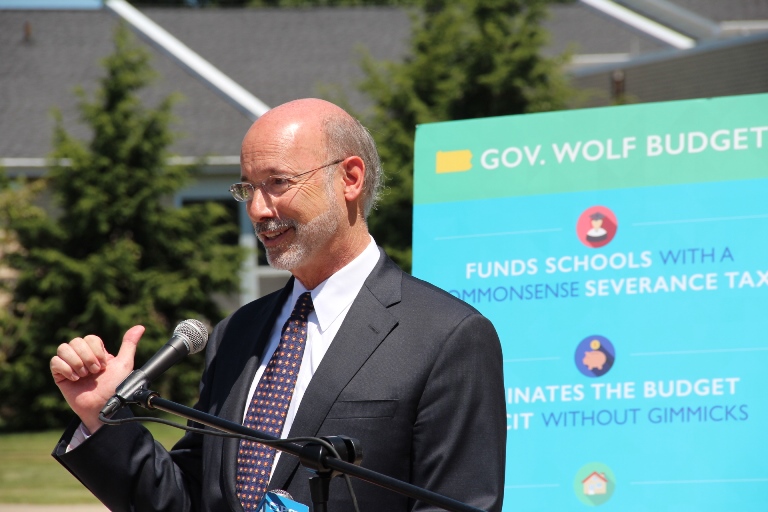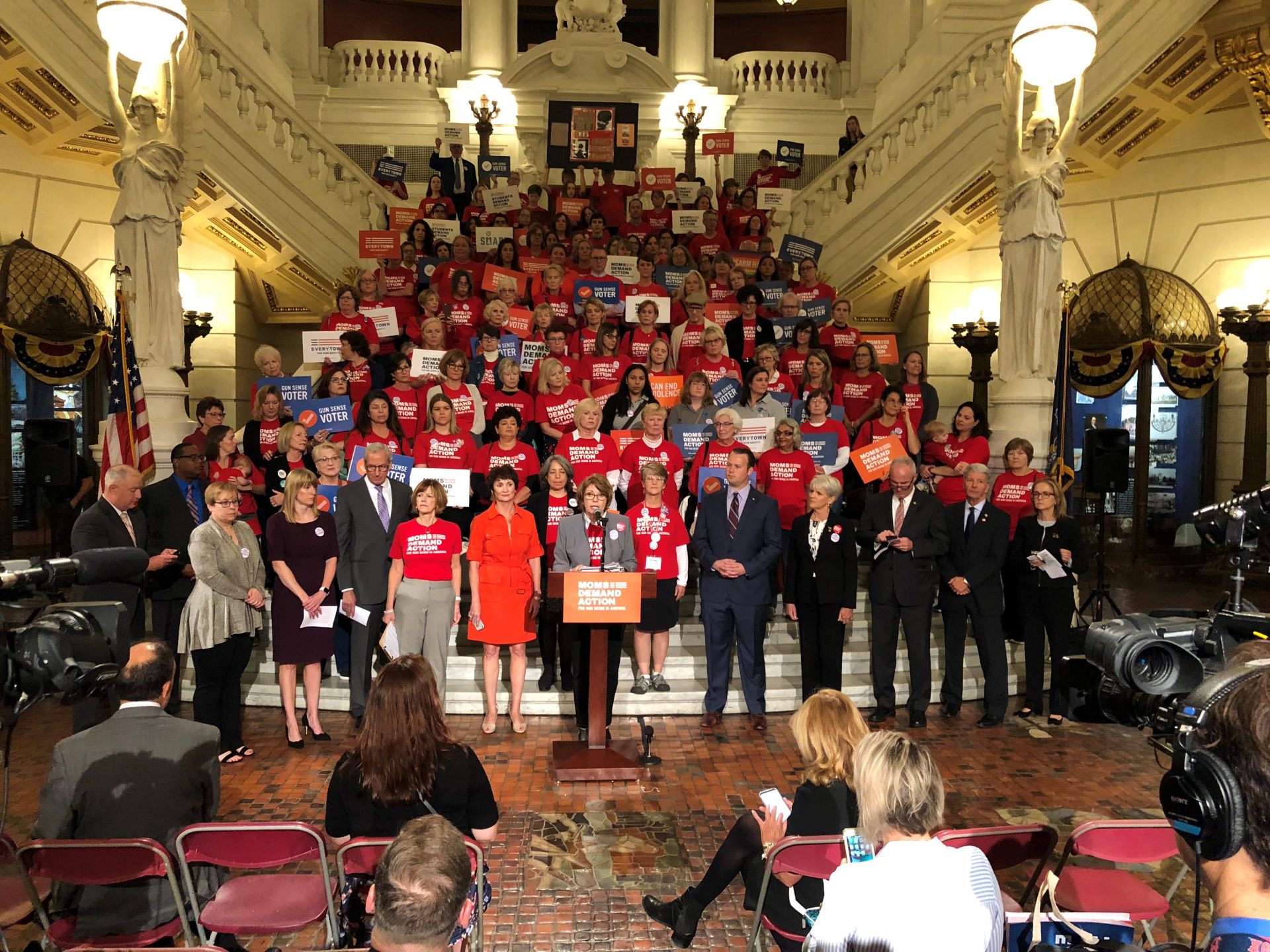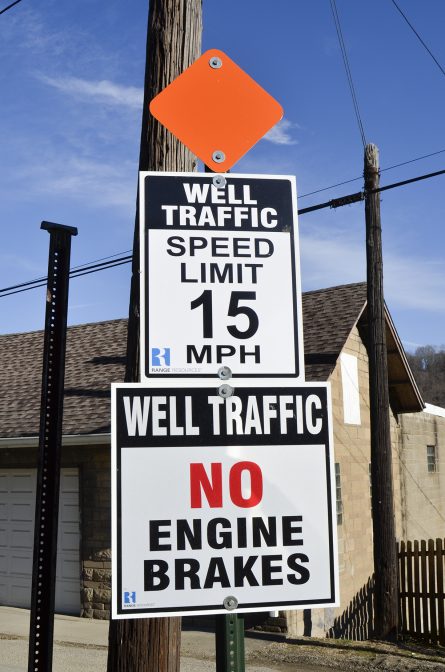
The Pennsylvania state Capitol.
Marie Cusick/ StateImpact Pennsylvania

The Pennsylvania state Capitol.
Marie Cusick/ StateImpact Pennsylvania

Marie Cusick/ StateImpact Pennsylvania
The Pennsylvania state Capitol.
The Pennsylvania governor’s race pits Gov. Tom Wolf, a wealthy York County Democrat, against Scott Wagner, a wealthy York County Republican.
Here’s what you need to know about the race.
Wagner and Wolf will had one debate: on Oct. 1 at the Hershey Lodge.
If you missed the debate, you can watch it at C-SPAN’s website. You can also see an annotated guide to key parts of the debate in another PA Post article.
The debate took place during the Pennsylvania Chamber of Business and Industry’s annual dinner. Alex Trebek, host of the game show “Jeopardy!,” moderated the debate. He got boos and bad reviews.
Wagner has wanted more debates. Wolf wanted only one. In the 2006, 2010 and 2014 races, the candidates appeared together three times, according to The Associated Press. Wolf defended the decision to a Pittsburgh TV station, saying “the election is one continuous debate.”
He is a Democrat from Mount Wolf, a town named for an ancestor or ancestors.
Wolf studied at Dartmouth College, served in the Peace Corps, earned a master’s degree from the University of London, and earned a doctorate in political science from the Massachusetts Institute of Technology.

Reid Frazier
Gov. Tom Wolf is seen in this file photo.
Wolf, 69, ran his family’s kitchen cabinet and building products company for years, served as state revenue secretary in Democratic Gov. Ed Rendell’s administration, returned to the family business and then was elected governor in 2014.
The 63-year-old Republican lives in Spring Garden Township. He has talked about growing up on a York County farm and shoveling horse manure as a kid.
He dropped out of what was then Williamsport Area Community College to pursue different business ventures. He founded a waste collection company in the 1980s, sold it in 1997, and then started a competing waste collection company, Penn Waste, in 2000.

Katie Meyer / WITF
Republican Scott Wagner officially launched his campaign for governor at a Penn Waste facility in January 2017.
He was elected to the state Senate through a write-in campaign in 2014. He won the Republican primary for governor in May 2018 and resigned from the state Senate weeks later.
Paul Glover, a Philadelphia resident who taught urban studies at Temple University, is the Green Party nominee. Ken Krawchuk, a computer programmer and businessman from Montgomery County, is the Libertarian Party nominee.
He has been compared to an Ivy League professor. He’s been called boring and, more kindly, folksy. He still lives in Mount Wolf, instead of in the Governor’s Residence in Harrisburg.
His brash style has earned him comparisons to Republican President Donald Trump. His comments have gotten a lot of attention, whether it’s by comparing unions to Adolf Hitler on the Senate floor or calling an 18-year-old activist “young and naive” at a town hall.
He has described himself as “proudly pro-life.” In the Senate, he voted in favor of legislation to shorten the state’s limit on abortions from 24 weeks to 20 weeks. And he supported a measure that would outlaw an abortion in any case when a fetus’ heartbeat can be felt — which is often possible at about six weeks.
During a July interview with WHYY, Wagner wouldn’t say whether he would sign a bill banning abortion in Pennsylvania if a more conservative U.S. Supreme Court overturns the Roe v. Wade decision of 1973.
In February 2015, the president of Planned Parenthood said Wolf was “the first governor in the history of the country who was also a former Planned Parenthood clinic escort,” according to the Pittsburgh Post-Gazette. In December 2017, Wolf vetoed the bill that would have banned abortion after 20 weeks or later.
His campaign website lists “Protecting Women’s Right to Choose” as one of his achievements.
In TV ads, Wagner has promised to eliminate school property taxes. In the state Senate, he supported a bill that would pay for that cut by raising the income tax rate from 3.07 percent to 4.95 percent and the state sales tax rate from 6 percent to 7 percent, while also expanding what is covered by the state sales tax.
Wagner’s campaign has said, if elected governor, he would focus on saving money first and that would reduce the amount of tax increase needed to fund school property tax elimination.
Wolf has not supported full elimination of school property taxes.
In his first budget address in 2015, he proposed raising the income tax rate from 3.07 percent to 3.7 percent and the state sales tax rate from 6 percent to 6.6 percent, while also expanding what is covered by the state sales tax, among other changes. He said the plan would lower school district property taxes by more than 50 percent for the average homeowner. The plan failed, in part, over disputes about how much certain districts would receive and how much of the new revenue would go to things other than property tax elimination.
In 2014, Wolf ran for office, saying he wanted the state to switch to a progressive income tax system, one in which higher earners paid a higher rate — although he declined to provide details on the rates he would support. He dropped that plan while in office and instead proposed the property tax reduction plan in his first budget address. That failed in the Republican-controlled Legislature.
In 2016, Wolf proposed raising the personal income tax rate from 3.07 percent to 3.4 percent. That also failed.
Earlier this year, Wolf said he wouldn’t need a budget-balancing tax increase in his second term, according to The Associated Press.
In ads, the Wolf campaign has said Wagner wants to tax retirement income for seniors, citing comments he made in 2016 to a conservative group in Berks County. Wagner says his comments were taken out of context and that he doesn’t support taxing retirement incomes.
Wagner made the retirement income comments in January 2016 while fielding a question about why the state can’t take back previously approved government pension benefits. Wagner said that’s unconstitutional. He said he would support allowing the state to declare bankruptcy if it wasn’t unconstitutional.
He added:
“The other problem we have is, and this really, this really angers me to a certain degree. We don’t tax retirement income in the state of Pennsylvania. OK. But you know what really upsets me is the two guys that are getting pensions from Penn State, the one guy $477,000 a year and $455,000 year. Do you think they could afford to pay a 3 percent tax?”
Wagner told the crowd that he and his chief of staff looked into taxing retirement income over $50,000 but can’t do it because it’s unconstitutional. (In Pennsylvania, the state constitution says taxes have to be “uniform, upon the same class of subjects …” — which has stood in the way of a progressive income tax.)
Wolf ran for office focusing on increasing education funding, and schools have seen funding increases while he’s been in office, including a $100 million increase in basic education funding in the most recent budget.
Wagner’s campaign has accused Wolf of planning a “drastic school funding change” that would cut money in hundreds of schools so that Philadelphia can have more. The criticism is based on statements Wolf made in June about supporting using a new formula for basic education money.
That kind of distribution would be massive and create winners and losers, WHYY reported, but Wolf offered no hard timeline for when that should happen. And a spokeswoman for Wolf later told WHYY: “Only when there is full, fair and adequate funding would he support putting all money through the formula. There currently is not, and there is no timetable for that to happen.”
In June 2015, Wagner told abc27 that “If we laid off 10 percent of the teachers in the state of Pennsylvania, we’d never miss them.” During a primary debate in March, Wagner said the state does “spend enough money in the schools per student.”
But in August, he released a plan to increase education funding by $1 billion without raising taxes. Wolf spokeswoman Beth Melena said Wagner was using “abracadabra math,” according to WHYY.

Ed Mahon / PA Post
Supporters of legislation to increase gun restrictions in protection-from-abuse and domestic violence cases rally at the state Capitol in Harrisburg on Sept. 24, 2018.
Wolf has supported expanded background checks for the private sale of rifles and shotguns, the creation of a new “red-flag” emergency protection order and a ban on devices, known as bump stocks, that allow semi-automatic weapons to mimic the firing speed of automatic weapons. None of those measures has passed out of the General Assembly.
Another proposal he supported, to increase gun restrictions in domestic violence and protection-from-abuse cases, recently made progress in the General Assembly. It passed out of the state House in September. The bill is now being considered in the state Senate, which unanimously approved a similar bill in March.
During a primary debate, Wagner was asked about what state measures — including expanded background checks, a ban on assault weapons and high-capacity magazines, and gun violence restraining orders — he supports or opposes.
Wagner didn’t come out in support of those measures. He said, as governor, he would want to know whether every background check application for guns is being “scrutinized to the fullest.” He also said “mental health is a huge issue” to address.
But Wagner did support a gun bill in the Senate to increase gun restrictions in domestic violence and protection-from-abuse cases — the same legislation Wolf has supported.

Amy Sisk / StateImpact Pennsylvania
A sign alerts drivers working in natural gas in Washington County to maintain slow speed limits.
Pennsylvania has an impact fee with the revenue based on each well drilled by gas companies.
When Wolf ran for governor, he pushed for a severance tax, one that would generate more revenue based on the volume of gas extracted.
Wolf’s efforts to pass such a tax have failed in the Republican-controlled Legislature.
Wagner has opposed a severance tax.

Ed Mahon/PA Post
Republican congressional candidate John Chrin poses for a picture in front of a Donald Trump-themed tractor-trailer on Sept. 12, 2018 in Luzerne County.
Wagner has often been compared to the Republican president. Both are brash businessman who were originally opposed by Republican leaders. Trump wasn’t Wagner’s first choice in the 2016 Republican primary, but by the summer of 2016, he was publicly talking about how he was bringing more Trump yard signs to Pennsylvania, and Wagner’s business hosted a campaign rally with Republican vice presidential nominee Mike Pence in September 2016.
Wolf’s campaign lists “Standing up to Donald Trump’s Extreme Agenda” as one of his achievements.
Earlier this year, Wolf proposed raising the state’s minimum wage from $7.25 an hour to $12 an hour.
While in the state Senate, Wagner proposed gradually raising the minimum wage to $8.75 an hour. Earlier this year, he said he would support an increase in the $8.75 to $9.50 range, according to WESA.
Wagner has declined to release his tax returns. At one town hall, he said he has met all financial disclosure requirements, and that it’s nobody’s business — including his employees — what he makes.
Wolf reported about $414,000 in adjusted gross income in 2017 and nearly $1.3 million in charitable donations, The Associated Press reported in September.
The AP also reported that Wolf made the two-page 1040 form public and allowed a reporter to review the rest of his 102-page federal tax return. Wolf did the same in the 2014 campaign.
Wolf has led Wagner in the polls. The RealClearPolitics average of polls had Wolf up by 19.6 percentage points as of Nov. 5.
RealClearPolitics and The Cook Political Report rate the race as a likely Democratic victory.
The days of journalism’s one-way street of simply producing stories for the public have long been over. Now, it’s time to find better ways to interact with you and ensure we meet your high standards of what a credible media organization should be.